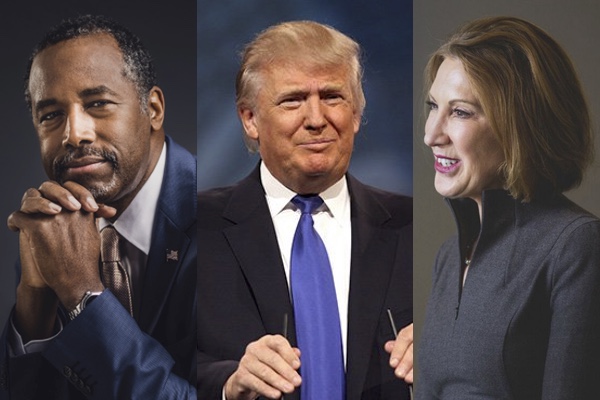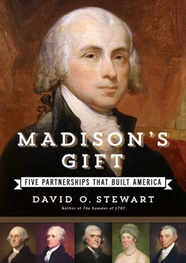So GOP Voters Seem Drawn to Presidential Candidates Who Never Won an Election? They Should Be Careful What They Wish For.

One striking pattern has emerged in our quadrennial slog to the presidential election: Republican voters – at least those who respond to pollsters – are bewitched by candidates who have never won elective office, much less ever been accountable to the public and subject to its whims and fancies.
An average of August voter polls assembled by Real Clear Politics places a bombastic billionaire businessman and a neurosurgeon at the top of the Republican heap. Donald Trump averaged 23.5 percent support in those polls, with Ben Carson second at 10.3 percent. Former tech executive Carly Fiorina stood seventh with 6 percent, above eight other current and former office-holders.
 Republican
voters have traveled this road before.
Who can forget the excitement surrounding Herman Cain four years
ago? A trade association executive, Cain
dominated Republican presidential straw polls in fall 2011, then his campaign
cratered amid allegations of sexual harassment and policy ignorance (for
example, his reference in an interview to “uz becki, beki, beki, beki stan
stan”).
Republican
voters have traveled this road before.
Who can forget the excitement surrounding Herman Cain four years
ago? A trade association executive, Cain
dominated Republican presidential straw polls in fall 2011, then his campaign
cratered amid allegations of sexual harassment and policy ignorance (for
example, his reference in an interview to “uz becki, beki, beki, beki stan
stan”).
The key distinction here is not that certain candidates claim to be outsiders and propose to “run against Washington.” Most presidential candidates now scramble to disavow responsibility for the “mess” in Washington, a pattern that began with Jimmy Carter’s promise to provide a government “as good as its people” and blossomed with Ronald Reagan’s two successful candidacies. After four years in the White House, Reagan was still running against Washington. The guy was good.
The striking point here is that so many leading Republican candidates have never won an electoral contest. Fiorina is the only one of the three who has ever run for office, coming up short in a 2010 race for the U.S. Senate in California.
Such electoral neophytes, however, are not unheard of in American presidential politics. Six men have won the presidency despite never having previously faced the voters. Those precedents, though, are not especially encouraging for Trump, Carson, and Fiorina enthusiasts.
Do Army Generals Count?
Four of those “non-politician” presidents were former army commanders: George Washington, Zachary Taylor, Ulysses Grant, and Dwight Eisenhower. Though only Washington was an outstanding president, none of the others ranks as an actual failure in the White House.
For two reasons, though, generals are not good predictors of non-politician presidents. The soldier-presidents had devoted much of their pre-presidential lives to public service, earning the loyalty of both the men who served in their armies and of all citizens. Moreover, high military position in a democracy requires deft political judgment. Commanders must meet the challenges of influencing and adapting to political leaders, as well as that great hairy beast, public opinion. Neither claim can be made for those who have never faced the voters.
Dropping the soldier-presidents as models, the non-politician president group shrinks to Chester A. Arthur (1881-85) and Herbert Hoover (1929-33), one-term presidents who consistently lag in the presidential rankings.
Arthur and Hoover
Even Arthur and Hoover, of course, had held public office before entering the White House, though “public service” may not describe Arthur’s years as Collector of the New York Customs House, the epicenter of Gilded Age graft and patronage.
Succeeding the assassinated James Garfield in office, Arthur is the only president in American history who never faced a single voter in an election contest in his own name. His only election campaign was as Garfield’s vice-presidential running mate in 1880. Although Arthur’s presidency exceeded expectations, expectations were very low for a man whose public reputation was built on patronage maneuvering and a truly outstanding wardrobe. His undistinguished administration rates well in the bottom half of American presidencies.
Hoover was in many ways a tragic case. A poor boy, he made himself a brilliant engineer and businessman, amassing riches before he turned 40. Hoover then devoted his immense organizational talents to feeding starving millions during and after World War I, and served for eight years as an admired Secretary of Commerce.
Yet the Great Depression beginning in 1929 confounded Hoover’s bright promise. With the American economy devastated, Hoover proposed policies that were not unwise, but he failed to muster congressional support for them and failed utterly to demonstrate that he cared in the slightest about the bitter crisis faced by ordinary Americans.
It is that last quality that may highlight the great risk of the president with no electoral experience. Dealing with public opinion, other politicians, and competing world leaders, while staying connected to the public mind, is not at all like squeezing banks for another construction loan, figuring out your next digital product, or taking the fearsome step of performing surgery on the human brain.
The public may hold political candidates in generally low regard, but the electoral experience builds key leadership skills. Candidates must learn how to read voters and public opinion, when to act boldly and when to sit quietly. The best of them learn how to move public opinion. Tycoons and physicians may have those skills, but their experiences are not geared to hone them.
Admittedly, a lifetime of pandering to voters is no guarantee of excellent White House performance. The presidential losers list bristles with those who won many elections. Start with Andrew Johnson. Or Franklin Pierce. Or James Buchanan.
Then again, Franklin Roosevelt, Abraham Lincoln, and Theodore Roosevelt were career politicians. So were Thomas Jefferson, James Madison and James K. Polk. After his movie career, Ronald Reagan spent more than a decade in electoral politics before winning the presidency.
We may yet see a non-politician become a splendid president. If we do, he or she will be the first.